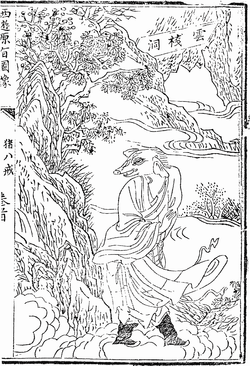This article needs additional citations for verification. (July 2022) |
| Zhu Bajie | |||||||||||||||||||||||||||
|---|---|---|---|---|---|---|---|---|---|---|---|---|---|---|---|---|---|---|---|---|---|---|---|---|---|---|---|
 15th-century depiction of Zhu Bajie | |||||||||||||||||||||||||||
| Chinese name | |||||||||||||||||||||||||||
| Traditional Chinese | 豬八戒 | ||||||||||||||||||||||||||
| Simplified Chinese | 猪八戒 | ||||||||||||||||||||||||||
| |||||||||||||||||||||||||||
| Vietnamese name | |||||||||||||||||||||||||||
| Vietnamese alphabet | Trư Bát Giới | ||||||||||||||||||||||||||
| Chữ Hán | 豬八戒 | ||||||||||||||||||||||||||
| Thai name | |||||||||||||||||||||||||||
| Thai | ตือโป๊ยก่าย | ||||||||||||||||||||||||||
| RTGS | Tue Poikai (from Teochew "Tu poih-kài") | ||||||||||||||||||||||||||
| Korean name | |||||||||||||||||||||||||||
| Hangul | 저팔계 | ||||||||||||||||||||||||||
| Hanja | 豬八戒 | ||||||||||||||||||||||||||
| |||||||||||||||||||||||||||
| Japanese name | |||||||||||||||||||||||||||
| Kanji | 猪八戒 | ||||||||||||||||||||||||||
| Hiragana | ちょ はっかい | ||||||||||||||||||||||||||
| |||||||||||||||||||||||||||
| Khmer name | |||||||||||||||||||||||||||
| Khmer | ជូ ប៉ាចេ | ||||||||||||||||||||||||||
Zhu Bajie,[a] also named Zhu Wuneng,[b] is one of the three helpers of Tang Sanzang, along with Sun Wukong and Sha Wujing, and a major character of the 16th century novel Journey to the West. Zhu means "swine" and Bajie means "eight precepts". Prior to his being recruited by the bodhisattva, Guanyin, Zhu Bajie went by "Zhu Gāngliè" (豬剛巤; literally "Strong-Maned Pig"). Buddhist scholars consider that both expressions are related to "Śīla pāramitā". In many English versions of the story, Zhu Bajie is called "Monk Pig", "Pig", "Piggy", or "Pigsy".
Zhu Bajie is a complex and developed character in the novel. He looks like a terrible humanoid-pig monster, part human and part pig, who often gets himself and his companions into trouble through his laziness, gluttony, and propensity for lusting after pretty women. He looks up to his senior disciple Sun Wukong as a big brother. Though he occasionally acts rebelliously when injured by Wukong's constant teasing, his schemes usually end in his own humiliation.
His Buddhist name "Zhu Wuneng", given by Bodhisattva Guanyin, means "pig (reincarnated) who is aware of ability" or "pig who rises to power", a reference to the fact that he values himself so much as to forget his own grisly appearance. Tang Sanzang gave him the nickname Bājiè which means "eight restraints" or "eight commandments" to remind him of his Buddhist diet.
In the original Chinese novel, he is often called dāizi (呆子), meaning "idiot". Sun Wukong, Tang Sanzang, and even the author consistently refers to him as "the idiot" over the course of the story. Bodhisattvas and other heavenly beings usually refer to him as "Tiānpéng" (天蓬), his former title when he was a heavenly marshal.
In modern times, Zhu Bajie is seen as a patron deity of masseuses, hostesses, and prostitutes within Taiwan and other parts of East Asia.[1]
Cite error: There are <ref group=lower-alpha> tags or {{efn}} templates on this page, but the references will not show without a {{reflist|group=lower-alpha}} template or {{notelist}} template (see the help page).
- ^ Brose, Benjamin (1 October 2018). "The Pig and the Prostitute: The Cult of Zhu Bajie in Modern Taiwan". Journal of Chinese Religions. 46 (2): 167–196. doi:10.1080/0737769X.2018.1507091. S2CID 171854226. Retrieved 16 September 2022.